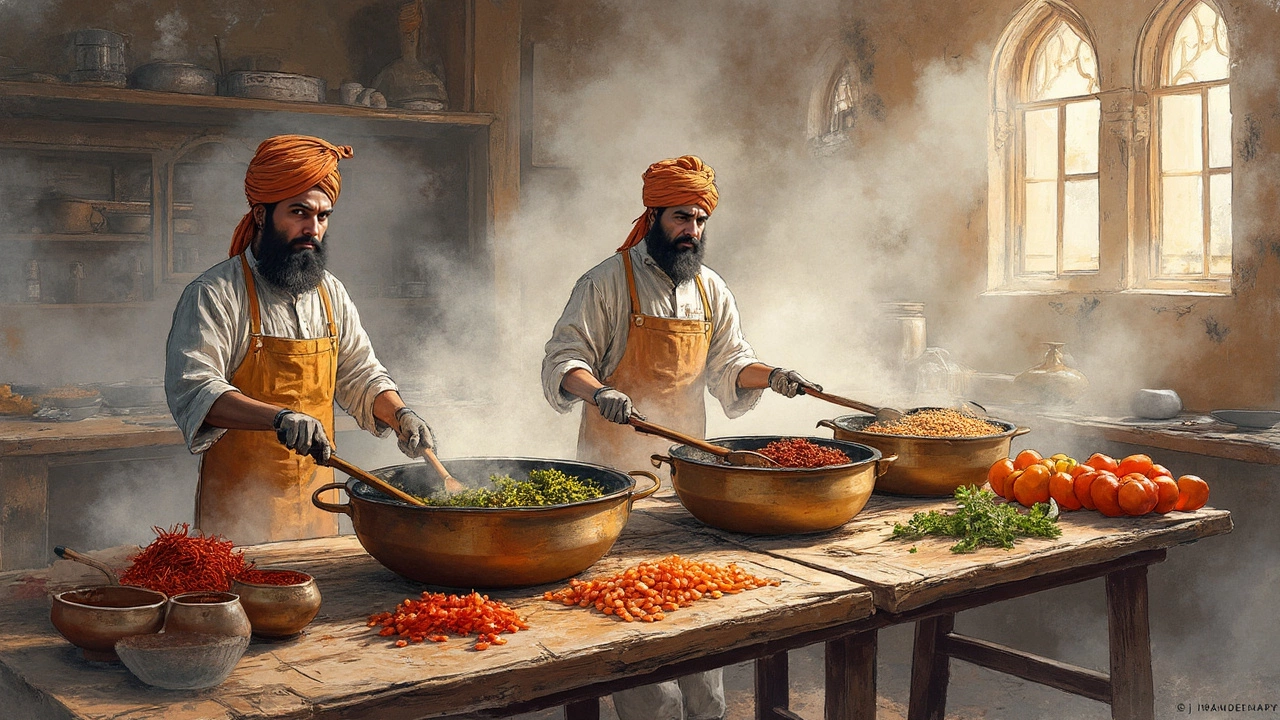Sikhs don't eat eggs, and if you're wondering why it's not just about personal preference, it's rooted in religious and cultural principles. Most Sikhs follow a lacto-vegetarian diet, aligning with the teachings of Sikhism, which emphasize compassion and non-violence.
You may ask, "What's so wrong with eggs?" In Sikhism, the principle of ahimsa, or non-harming, extends to animals. Eggs are seen as potential life, so avoiding them is part of practicing kindness.
Isn't this just a limitation, though? Not really! Sikhs have crafted a delightful array of vegetarian breakfasts that don't compromise on taste or nutrition. Think parathas, chole bhature, or poha—all delicious morning options without a hint of egg.
And nutritionally speaking, you won't miss out. There are plenty of ways to get your protein fix, like through paneer or lentils, which feature prominently in many Sikh households.
- Sikh Beliefs and Dietary Practices
- Understanding Egg Restrictions
- The Role of Vegetarianism in Sikhism
- Nutritional Alternatives to Eggs
- Popular Sikh Breakfast Dishes
- Tips for Creating Tasty Vegetarian Breakfasts
Sikh Beliefs and Dietary Practices
Sikhism, founded over 500 years ago by Guru Nanak, promotes a lifestyle of compassion and balance through its dietary principles. It's not just about what you eat but how you live. The Sikhs follow a simple yet profound rule: live harmoniously without causing harm.
A key aspect of this is the adherence to a vegetarian diet. This choice isn't merely a family tradition but a commitment to a core belief in compassion and non-violence. Most Sikhs choose to avoid meat and eggs, believing it's a way to uphold respect for all living beings.
Langar: Community and Equality
One notable practice is the langar, a community kitchen found in gurdwaras (Sikh temples). It serves free, vegetarian meals to anyone, regardless of their background or creed. Here, the emphasis is on equality and unity—everyone sits on the ground together to dine, representing that no one is above or below another.
An Evolving Tradition
While traditional Sikhs strictly adhere to these dietary values, some modern Sikhs might incorporate eggs or meat into their diets due to personal choice or lifestyle changes. However, the core value remains respect and kindness towards all living forms.
Nutritional Wisdom Passed Down
Sikh diets are often rich in lentils, vegetables, and dairy, ensuring nutritional balance. These foods provide essential proteins and nutrients without compromising religious values.
| Nutrient | Vegetarian Sources |
|---|---|
| Protein | Lentils, Paneer, Beans |
| Iron | Spinach, Chickpeas |
In the end, the dietary practices of Sikhs are an intersection of faith, health, and a profound respect for life, all coming together in a tradition passed down through generations.
Understanding Egg Restrictions
If you've ever wondered why Sikhs avoid eggs, it's a mix of religious beliefs and lifestyle choices. Sikhism, founded over 500 years ago, places a strong emphasis on compassion and respect for all living beings. This belief naturally extends to dietary practices.
In the Sikh community, following a vegetarian diet is seen as a reflection of their commitment to being non-violent towards all creatures. Eggs, being potential life forms, fall into a category that many Sikhs choose to avoid as part of this ethical stance.
"For a Sikh, the ideal is a diet that is natural and in harmony with the welfare of all beings." – Dr. Kharak Singh, eminent Sikh scholar.
Religious Context
The roots of this dietary choice come from Sikh teachings that discourage the consumption of animal products that involve harm or potential life termination. Although not all Sikhs are strictly vegetarian, those following the strict code of conduct, like the Khalsa, are encouraged to avoid meat and eggs.
Modern Implications
For many Sikhs today, the tradition continues out of respect for their cultural heritage and religious beliefs. Some might even regard it as a way to connect more deeply with their faith and community.
Common Misunderstandings
- Not all Sikhs avoid eggs due to dietary rules—personal choices vary.
- Being vegetarian is not about restriction but embracing a compassionate lifestyle.
By understanding these reasons, it becomes clear that this practice isn't just about following religious teachings; it's a broader reflection of values that prioritize life and harmony. This makes the Sikh diet quite unique in its approach to eggs and all animal-derived foods.
The Role of Vegetarianism in Sikhism
So, what's the big deal about vegetarianism in Sikhism anyway? It's not just a dietary preference but a significant part of the spiritual and ethical framework laid down by Sikh teachings. The emphasis on a vegetarian diet is rooted in the values of compassion and respect for all life—principles deeply embedded in the Sikh faith.
Sikhs aim to lead a life that is in harmony with nature and minimizes harm to living creatures. The idea here is to respect the living beings—animals included—by refraining from eating them. Sikh teachings encourage eating food that is simple and minimally processed, promoting a lifestyle that is kind and conscious.
Religious Teachings Behind the Practice
The Gurus who founded Sikhism preached the importance of living a life in balance and with respect for God's creation. Texts from the Guru Granth Sahib, the primary scripture of Sikhism, discuss the essence of humility and care for life around us as a form of devotion to God. This understanding extends to dietary practices, promoting the consumption of vegetarian food as an expression of these values.
The Practical Side of Vegetarianism
Following a vegetarian lifestyle is also practical when considering the communal meals, or ‘Langar’, served in gurdwaras (Sikh temples). These meals, which are open to everyone regardless of religion or background, are always vegetarian, ensuring inclusivity and reflecting the principle of equality. It's about offering a meal that anyone can partake in without dietary restrictions getting in the way.
Some people might wonder if this limits dietary options, but in reality, it opens up a world of delicious vegetarian choices that are both satisfying and nutritious. From spiced chickpea dishes to diverse lentil soups, the options are plentiful and flavorful!

Nutritional Alternatives to Eggs
Skipping the eggs doesn’t mean missing out on nutrition. Plenty of alternatives can fill the gap, keeping your meals balanced and interesting. Whether you’re following this path for Sikhism or just trying something new, let’s explore some tasty and nutritious options.
Protein Powerhouses
Getting enough protein without eggs is easier than you think. Foods like paneer and tofu are great substitutes. They pack a protein punch and are super versatile. Tofu, for instance, can be scrambled, fried, or added to a curry.
Lentils and beans are other excellent choices. Dishes like dal or chickpea curry provide not only protein but also essential vitamins and minerals.
Healthy Fats and Omegas
Nuts and seeds are fantastic for healthy fats. Almonds, walnuts, and chia seeds are great for breakfast. Sprinkle them over porridge or blend into a smoothie for an extra nutrient boost.
Boosted Breakfasts
For a quick breakfast, oats are a fantastic option. They’re easy to prepare and can be paired with fruits, nuts, and even yogurt for a complete meal without any eggs.
If you’re missing the texture of an egg in your recipes, flaxseed meal or chia seeds soaked in water can act as binding agents, perfect for pancakes or muffins.
- Flax Seeds: Mix one tablespoon with three tablespoons of water, let it sit for a few minutes and you've got a great egg replacement.
- Chia Seeds: Similar to flaxseed, chia works well in binding and also adds a crunch.
As a bonus tip, remember that a varied diet ensures you're hitting all your nutritional needs. Mix up these alternatives in your meals so you get a balanced intake of everything your body needs.
Popular Sikh Breakfast Dishes
When it comes to breakfast in a Sikh household, flavor and nutrition go hand in hand. For Sikhs sticking to the lacto-vegetarian diet, mornings kickstart with a celebration of colors and spices.
Parathas Galore
Parathas are a staple in Sikh kitchens. These are unleavened flatbreads, often stuffed with a variety of tasty fillings like potato (aloo), paneer, or cauliflower (gobi). They are cooked with ghee, giving them a crispy texture and a rich flavor. Parathas are usually paired with yogurt or homemade pickles, making for a hearty start to the day.
Classic Chole Bhature
Chole Bhature is another breakfast favorite. This dish features spicy chickpeas (chole) served with deep-fried bread (bhature). It's not only delicious but a filling option that keeps you going throughout the morning. A sprinkle of chopped onions and a dash of lemon elevate the taste further.
Nutritious Poha
Poha offers a lighter yet flavorful choice. It's made from flattened rice, cooked with mustard seeds, turmeric, green chilies, and plenty of fresh coriander. Often, it’s topped with peanuts for crunch or garnished with grated coconut, offering a refreshing taste.
Dal or Paneer Stuffed Dishes
Sikh breakfasts also include dishes like dal paranthas or paneer bhurji—all rich in protein, sticking to the vegetarian theme. These not only provide a great start to the day but also fulfill the nutrient requirements without needing eggs.
Mung Bean Pancake: Puda
A unique dish is the mung bean puda, which is like a savory pancake made with mung bean flour. It’s packed with protein and serves as an alternative to traditional pancakes.
These breakfast options not only satiate hunger but reflect the principles of Sikhism where each dish is made with love and enjoyed in the company of family—exactly how breakfast should be.
Tips for Creating Tasty Vegetarian Breakfasts
Creating a delicious vegetarian breakfast is easier than you might think. With a little creativity, you can whip up meals that are so satisfying, you won't even miss eggs. Let's dive into some tricks and ideas to brighten up your morning routine.
1. Mix Up Your Grains
Start by experimenting with grains like quinoa, oats, and millet. Not only are they nutritious, but they also keep you full longer. Try a warm quinoa bowl with roasted veggies or a creamy oatmeal topped with fresh fruits and nuts.
2. Protein-Packed Paneer
Paneer is a powerhouse of protein, and it's versatile too. Make a quick paneer bhurji by crumbling it and cooking it with onions, tomatoes, and spices. Serve it with some toasted bread for a hearty start.
3. Try Lentil Breakfast Dishes
Lentils, or dal, aren’t just for lunch or dinner. Whip up a South-Indian style dosa or idli using fermented lentil and rice batter. These dishes are not only flavorful but also packed with nutrients.
4. Veggie Pancakes
Why not switch things up with savory pancakes? Mix chickpea flour with veggies of your choice, add some spices, and cook on a non-stick pan. It's quick, customizable, and so delicious.
5. Smoothie Boost
Smoothies are quick and packed with everything good. Blend spinach, bananas, and a scoop of plant-based protein powder like soy or pea. Add a touch of honey or dates for sweetness.
| Ingredient | Nutritional Benefit |
|---|---|
| Quinoa | High in protein and fiber |
| Paneer | Rich source of calcium and protein |
| Chickpea flour | Gluten-free and high in protein |
With these tips, you can easily create filling and delicious vegetarian breakfasts. Remember, variety is key—so keep experimenting with different ingredients and flavors!
